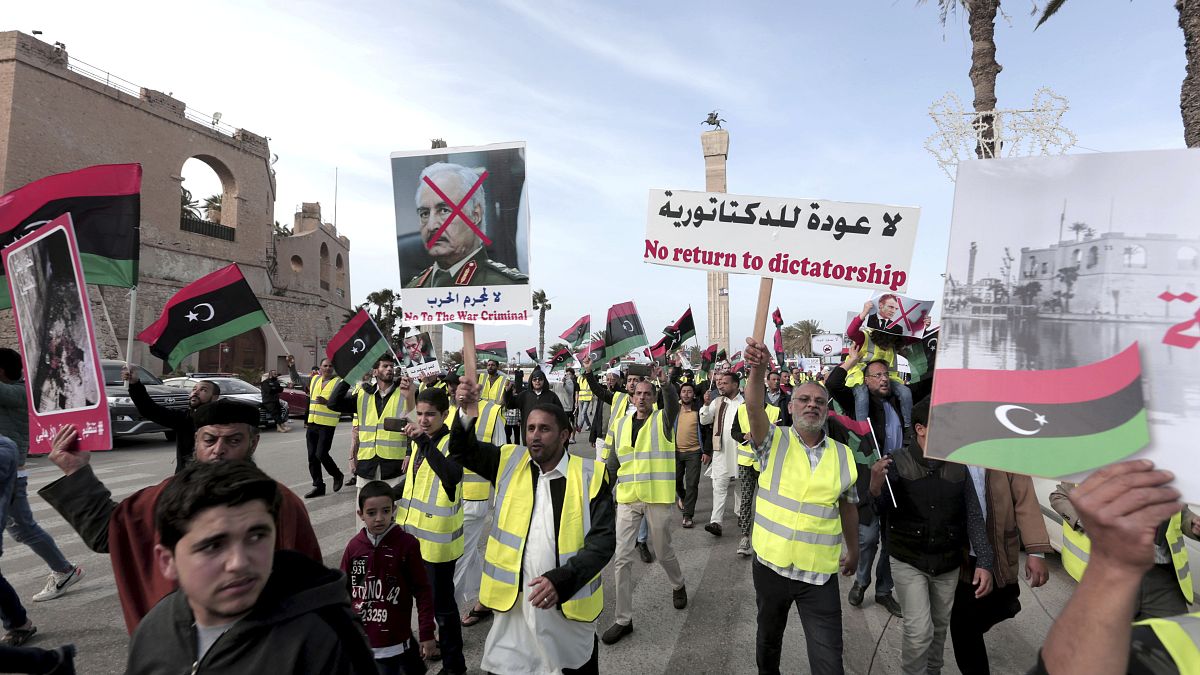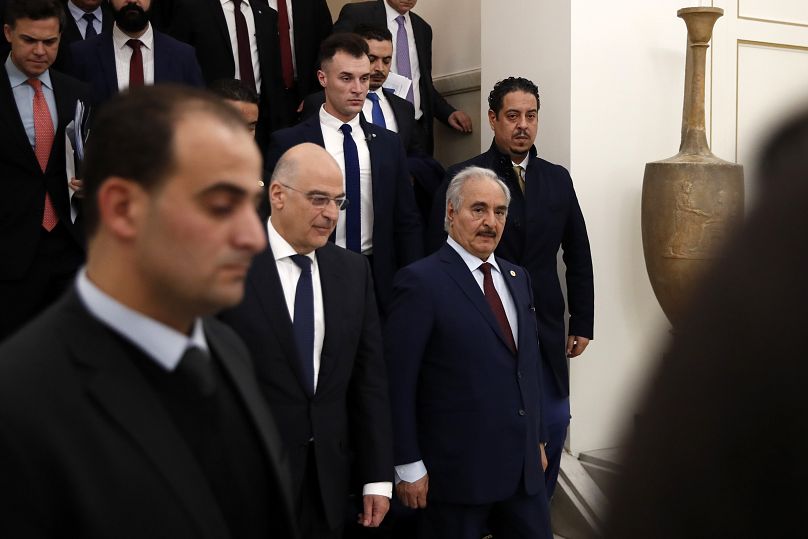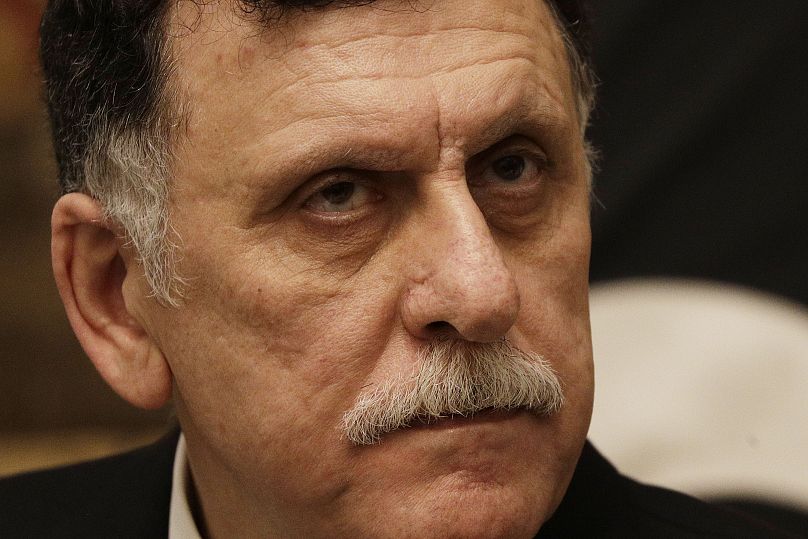Here's our explainer on the Libyan conflict and the peace talks taking place in Berlin on Sunday.
European leaders are hoping that a summit in Berlin on Sunday can bring an end to the latest round of fighting in the Libyan civil war.
The talks are expected to bring together the two main parties in the conflict: Prime Minister Fayez al-Sarraj, who heads the UN-recognised government in Tripoli, and General Khalifa Haftar, based in the eastern city of Benghazi.
Haftar began an offensive against Tripoli in July 2019, and over the last nine months at least 2,000 soldiers and over 200 civilians have been killed. But Haftar’s strike was met with stronger-than-expected opposition from Libyan government forces.
On January 12, a ceasefire was brokered between the two parties during talks in Moscow, with details to be hammered out the following day. However, Haftar left Moscow before the talks could be restarted, believing a power-sharing deal with Serraj was effectively a defeat.
As a result, Haftar and Serraj go into the talks on January 19 as intransigent as ever.
How did we get here?
Ever since the overthrow of Muammar Gaddafi in 2011, Libya has been riven by fighting between tribal groups, militias and Islamists, including extremists from the so-called Islamic State militant group (IS) and other jihadi groups based in the country’s lawless desert regions.
The chaos has allowed people-smuggling gangs to use Libya as a base for sending refugees and migrants across the Meditteranean to Italy, and the horrific conditions experienced by migrants in Libyan detention centres has attracted worldwide attention.
Despite an arms embargo since 2011, numerous countries have been accused of arming various parties in Libya’s long and complex civil war. Most recently Turkey, which agreed to send troops in to back the government in Tripoli against Haftar on January 2.
Who is backing who?
UN Secretary-General Antonio Guterres warned earlier this week against “external influence” in Libya, but a simple rundown of the myriad international actors in that north African nation’s bloody civil war suggests firmly that that particular ship has sailed.
The coalition of nations lined up behind Haftar and his Libyan National Army (LNA) include Saudi Arabia, the United Arab Emirates, Egypt and Russia, as well as France.
Haftar has increasingly demonstrated his willingness to be all things to all people and has appealed to French interests due to his fervent opposition to Islamist forces in north Africa and his much-vaunted efforts to tackle IS influence in Libya.
Saudi Arabia, the UAE and Egypt — all fighting their own battles against both political Islam and Islamist extremism — see Haftar as a safe pair of hands, while viewing his strongman leadership style as a check on democratic forces in Libya as well as in their own countries.
Lastly, Haftar’s support in both Riyadh in Cairo has been noticed in Washington, which has not yet taken a side on the conflict. Soon after the beginning of his April offensive on Tripoli, Haftar had a telephone conversation with National Security Adviser John Bolton.
Turkey and Qatar, meanwhile, back the Sarraj government in Tripoli. Speaking on Saturday, Turkish President Recep Tayyip Erdogan called Haftar a “warlord” and “coup-plotter” and warned Europe that not backing Sarraj would be a mistake “of historic proportions”.
Will it work?
Sarraj has claimed as recently as Friday that he believes Haftar has no intention of agreeing to a ceasefire and is using the talks as space while he re-groups for a renewed strike on the capital. Haftar meanwhile has only agreed to attend the talks “in principle”.
Haftar walked away from peace talks in Moscow on Monday, and although Turkey and Moscow brokered a ceasefire a week ago, there have been reports of renewed fighting.
The difficulty for the peace brokers is not only that so many international players have a dog in the fight in Libya, but that the aspirations of both major parties can’t help but clash. Haftar wants nothing less than total control of Libya, something Sarraj could never accept.
Barah Mikail, director of Stractegia Consulting, said that the summit is unlikely to lead to an end to the fighting, given that international players are so entrenched in the conflict.
“There are few chances the Berlin talks lead to a concrete and durable ceasefire: the UAE, Egypt and Turkey, in particular, seem to have no intention of backing out when it comes to the financial and military support they give to their respective allies on the ground,” he said.
Meanwhile, there is a stark polarisation between those loyal to the government and those backing Haftar.
“A proxy war prevails with many foreign actors engaged on the ground,” said Mikail. “In this context, everyone feels they have to take sides.”
What’s Europe’s role?
Two of Europe’s key concerns in the country have been migration and terrorism with the argument that a stable Libya is less likely to provide a haven for smuggling gangs or safe-haven for Islamist militants just a short distance from European shores.
But securing peace in Libya would also be a diplomatic coup for Europe, especially in the face of Turkish and Russian diplomacy, argued Tarek Megerisi in an article for the European Council on Foreign Relations (ECFR) on 16 January.
“Europe retains an authority over the diplomatic space that it can confer on any future settlement. It should not under-appreciate this power to legitimise during the Berlin conference and what comes afterwards,” he said.
A failure to act, he said, would be to allow “other, more decisive, actors onto the field”, allowing Russia and Turkey to achieve a foreign policy "win" that would play to their geopolitical interests in Europe’s backyard.
The problem is that on Libya, Europe is divided. France has thrown its lot in with Haftar, Italy has failed to take either side and so alienated itself with both, Greece — as recently as Friday — has moved closer to Haftar in the face of Sarraj’s closeness to Turkey.
“Repairing Europe’s credibility, and its role in proceedings may be a long road. But if Europe does not start to more assertively pursue stability and use the tools at its disposal then it will be cut adrift,” Megerisi wrote.


